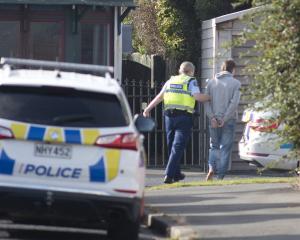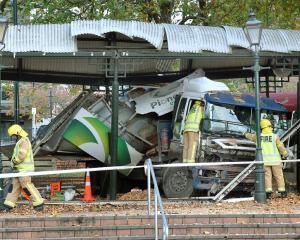Following National MP Jami-Lee Ross’ sectioning to an Auckland mental health facility, health reporter Mike Houlahan looks at what that process involves, and how often it is used in the South.
One of your fundamental rights is the right to refuse medical treatment - it is in the New Zealand Bill of Rights Act.
However, Parliament also created ''justified limitations'' on those rights, which is where the Mental Health (Compulsory Assessment and Treatment) Act comes in.
The law recognises that often someone with a mental health issue may not be competent to decide what is best for themselves.
For that to happen, the person must have a ''mental disorder'', and that condition must be of such a degree that it poses a serious danger to the health or safety of that person or of others; or seriously diminishes their capacity to take care of themselves.
Then, someone has to be concerned enough about that person's wellbeing to apply for their mental health to be assessed.
Any person can make an application: you need to be over 18, have seen the person within the past three days, and believe they have a mental disorder.
Each district health board region has a director of area mental health services, who after receiving an application must immediately organise an assessment examination, to be carried out by a clinician.
The possible future patient will be provided all details to voluntarily attend the assessment, but the Act recognises not everyone ordered to undergo an assessment will co-operate - section 41 authorises police to assist, if required.
However, police must have a warrant to act (unless impractical to get one) and their powers are restricted to respect Bill of Rights unlawful detention requirements - police can only detain a person for six hours, or the length of the assessment, whichever is shorter.
If a preliminary assessment finds reasonable grounds for belief the patient has a mental disorder, they must be assessed and have treatment for five days.
The Act says patients under assessment must accept whatever treatment a clinician may direct; likewise any patient committed by a compulsory treatment order must accept treatment for the first month of the order.
Some safeguards are in place: patients are not required to submit to electroconvulsive therapy or brain surgery.
After the five-day period, the patient can be subject to further assessment and treatment for up to 14 days - although if a clinician believes they can be treated adequately as an outpatient, they must discharge the patient.
Before the 14 days end, the clinician must lodge a certificate of final assessment whether or not the patient still requires compulsory treatment. If they do, the clinician has to make a court application for a compulsory treatment order, an application usually determined by a Family Court or District Court judge, who must examine the patient.
A compulsory treatment order can be for up to six months, and covers both treatment in hospital or the community.
The first month is compulsory. The order can then only proceed with informed consent of the patient, with an independent psychiatric examination, or in an emergency.
A compulsory treatment order can be extended for two six-month periods; any third order is indefinite, although a patient or guardian can apply to a review tribunal for the order to be withdrawn.
In the Southern DHB region, from 2016 to present, 1183 persons had met the criteria for further assessment and treatment. Of those, 429 people met the criteria for a compulsory treatment order.
SDHB director of area mental health services Ruth Manning said she and other directors were not directly involved in every application, as their authority could be delegated to Duly Authorised Officers (DAOs), a registered health professional, and Responsible Clinicians.
''Within the mental health service setting 'sectioning' is not a commonly used term, but for some lay people, they may understand the term to mean that someone requires a mental health assessment,'' she said.
''Anyone seeking advice regarding the MH Act will commonly be referred to a DAO, usually within a mental health team rurally and urban mental health crisis teams.''
Need help?
Healthline 0800 611 116
Lifeline Aotearoa 0800 543 354
Suicide Crisis Helpline: 0508 828 865 (0508 TAUTOKO)
Samaritans 0800 726 666
Alcohol Drug Helpline 0800 787 797
General mental health inquiries: 0800 44 33 66
The Depression Helpline 0800 111 757












